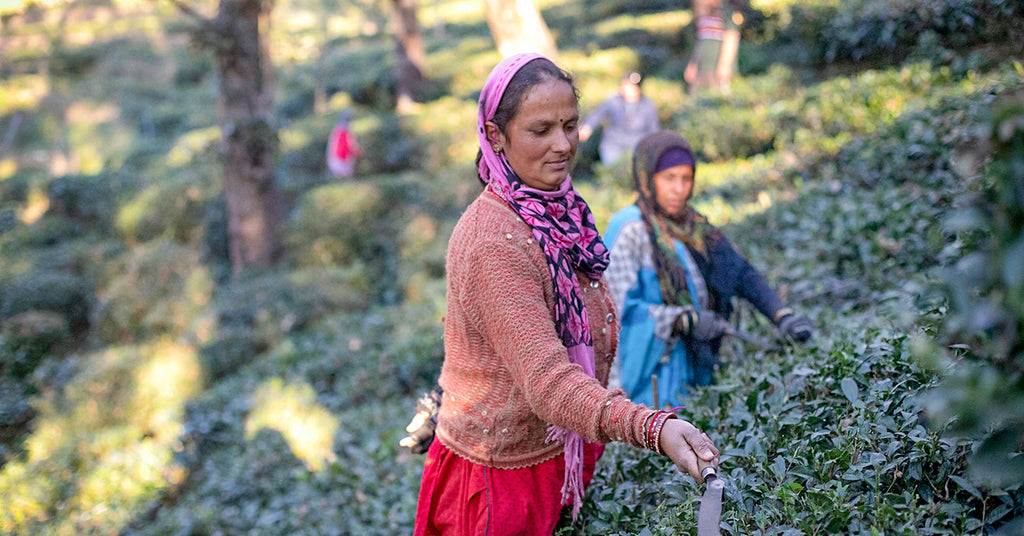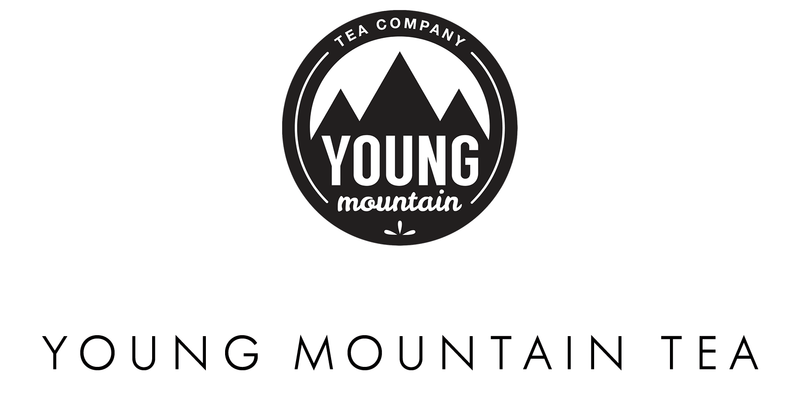Why Empowering Farmers Matters

I can still clearly remember the first time I saw food come out of the ground. I was a teen and on my friend Julie’s family farm, a beautiful plot of land perched above the shores of Lake Superior. Julie’s mom pulled a carrot out of the soil, and I was stunned by the small miracle she performed in front of my eyes.
At that moment, I realized most of us live in a world where food comes only from the grocery store, and always at a low, fixed price. We exist disconnected from the plants and people on which we depend, and we do so at our own peril. Tea is no exception, but the good news is, there’s a way to change it.
Untapped Potential
A handful of years after watching Julie’s mom pull that first carrot out of Michigan soil, I was in my mother’s ancestral village in southern India, watching my uncle harvest groundnuts from the family farm. I was a senior in college and had launched a project to power the local school with solar power. Working alongside boys my own age woke me up to two truths that have guided me since.
The first truth: India has unbelievable untapped potential in its villages. I was struck by how bright, motivated, and entrepreneurial the boys my age were. From fixing their bikes with wires salvaged from discarded umbrellas, to installing solar panels onto the roofs of buildings while wearing flip flops, they had an intuitive resourcefulness unmatched by anything I’d seen in the States. I asked myself, imagine if all that human ingenuity was given a chance to shine—what would be possible?
Tea Farmers Need To Earn More
The second truth: urban migration is hollowing out agricultural communities. When I returned to the same village 10 years later, the boys I had been so inspired by had all moved to Bangalore for jobs in hotels or to work as electricians supporting India’s IT boom.
The next generation of would-be farmers aren’t staying on the family farm, they’re headed to the cities to feel more connected to the modern world and to earn more. And I soon learned that the Indian tea industry is one of the worst examples of a food system out of balance.
Indian tea farmers typically don’t own any part of tea’s production process, not the land, not the tea plants, not the harvest, nor the finished tea. They depend on the owners of gardens for housing, food subsidies, healthcare, and more. It’s a system first established by the British in the mid 1800s, and it was wildly successful at creating huge amounts of cheap tea. Unfortunately, that tea was subsidized by unwilling human labor. As the world wakes up to that reality, the teas that we know and love so much are bittered with the truth that the tea industry is still staffed by an oppressed workforce.
It’s tempting to blame the owners of the gardens, but the owners themselves aren’t doing well either. Operating massive, labor-intensive estates where costs are always increasing puts owners in a bind. Customers expect the same price year-after-year (because ultimately, so do the end consumers in the grocery store) so raising prices is all but impossible. As a result, many tea gardens are shutting down entirely or being sold off. Last September, the Economic Times reported that over half of Darjeeling was for sale, a sobering statistic for any tea lover to confront.
In short, the model for the world’s second largest tea producer is failing. It’s failing the farmers, and its failing estate owners too. But the good news is, there’s reason for hope.
And we see farmer ownership of tea as central to that hope. When farmers have ownership in their work, their incentives and motivations are fundamentally different than when they simply work for a wage. When they own the land and the harvest they make, they’re in a stronger financial position. And when they own the factories that process the harvest into the same tea you and I drink, and when those factories make tea that’s of a quality to fetch high prices, then we have a situation where everyone wins. That’s why our mission statement is “to work with tea farmers to raise the quality of their tea, so they can earn more and raise the quality of their lives.” Farmer ownership allows tea farmers to have pride in and power over their work, creating teas that shine, and meaningful livelihoods that sustain rural farming communities for generations to come.
Farmer Empowerment Beyond Income
But empowerment goes deeper than just income. Amartya Sen, an Indian economist and philosopher who received the Nobel prize, wrote powerfully about this in his book, “Development As Freedom.” Empowerment (or development or whatever word we use) is not just about earning money; it’s about cultivating a sense of control over one's future. Self-determination and agency are critical to one’s ability to flourish, as is having enough money to pay the bills.
And central to this is the role of women. Of the tea farmers we work with, 90% are women, yet they have very little control over the money they earn. Their husbands, fathers, or in-laws are often calling the shots. Deeply ingrained patriarchal practices are often difficult to pinpoint and slow to change because they reach into every aspect of life, from religion to work to socializing to parenting. Our mission is rooted in a belief that eliminating patriarchal dynamics in the tea industry is necessary. And yet, as outsiders to the communities we exist to serve, we have to handle our role with a blend of firm determination and flexible implementation if change is going to stick. If we go into communities and lead with our Western notions of gender equity, we run the risk of replicating the same neo-colonialism and being ignored. We have to meet people where they are, through people they trust, and that begins with listening deeply.
Working With Local Partners
To handle the non-financial dynamics of empowerment, the most sensitive-yet-consequential aspect of our work, we’re taking a team approach. We’ve enlisted the help of a local farmer cooperative named Earthcraft to lead a series of empowerment trainings, and organized these trainings around four topics:
- Empowering the farmers to self-organize: crafting a mission statement, developing a strategic plan, and cultivating local leadership.
- Involving women in governance: Helping select representative leadership, and running gender and class sensitivity trainings for the Board of the factory.
- Developing metrics for empowerment: Adapting global impact metrics to what make sense for the local context, conducting a baseline study, and training farmers in data collection and analysis.
- Running a business: Quality control, accounting and inventory management, understanding supply chains, and more.
In my mind, this type of work is what differentiates true empowerment from income support. Actively organizing farmers to take control of their future requires a far deeper level of commitment and trust than simply saying “We’ll buy your teas at a good rate.” To pay a group of farmers a good rate, there first has to be a group of farmers to pay!
And I’ve worked with Earthcraft long enough to know that they are the right partners to make this happen. Their founders, Rashmi Bharti and Rajnish Jain, treat each and every co-operative member with respect and dignity, and their leadership team of trainers comprises both men and women.
The entire complexity of the work came together last December, when we met with one of the first villages to get involved in owning the factory. Sitting under the banana trees and drinking chai, the first thing that happened was Lalita, one of Earthcraft women trainers, started to sing a traditional song to make the women feel more comfortable. Rajinsh, sitting on the ground next to Lalital, hummed along.
Then when we began the conversation, Desmond, our farmer partner who has worked with the village for more than 20 years, leaned into the conversation to provide farmers assurance that someone they knew and trusted was involved. In my broken Hindi, I explained our work at Young Mountain Tea, and who we would be buying the tea from these farmers to sell in the US. It was a shape-shifting conversation, where we intentionally blended presenting Desmond’s role as the local known figure with Earthcraft’s role as a support partner with Young Mountain Tea’s role as the market linkage that would create a sustainable path forward. On the way out of the village, one of the elders (a man) came to me and said “We’re with you.” Standing in the cold December mountain sunshine, his comment was one of the most affirming moments of the journey so far.
The Road Ahead
We know that this is long-term work. We know that standing with farmers is easy to give lip service to, but the real work is difficult and messy. However, we also know it’s the right thing to do. And we know that if we don’t, there might not be a future for tea at all. Armed with optimism over what’s possible if we change the system, and a healthy concern for what’s likely if we don’t, we move forward.
Want to Know More About How You Can Change The Tea Industry?
You might also enjoy:
Blog Author:

Raj Vable, Founder
He has been confounded by the leaf since his first transcendental encounter with white tea in 2010. Three years later, he started Young Mountain Tea to bridge his budding tea obsession with his interest in traveling in the mountains and previous experience creating job opportunities in rural India. He revels in working across cultures and can be regularly found trying to get the rest of the team on board with another outlandish tea project. His favorite teas remain white, and he’s always searching for the next cup of magic.






Comments on this post (1)
Great blog post Raj. Very eye-opening!
— Giuditta